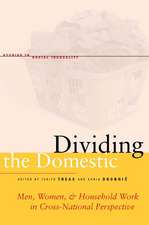The State Nobility: Elite Schools in the Field of Power
Autor Pierre Bourdieu, et al. Traducere de Lauretta Clough Autor Loic Wacquanten Limba Engleză Paperback – 31 ian 1998
In this major new work, Pierre Bourdieu examines the distinctive forms of power—political, intellectual, bureaucratic, and economic—by means of which contemporary societies are governed. What kinds of competence are claimed by the bureaucrats and technocrats who govern us? And how do those who govern gain our recognition and acquiescence?
Bourdieu examines in detail the work of consecration that is carried out by elite education systems—in France by the grande écoles, in the United States by the Ivy League schools, and in England by Oxford and Cambridge. Today, this "state nobility" has at its disposal an unprecedented range of powers and distinctive titles to justify its privilege. Bourdieu shows how it is the heir—structural and sometimes genealogical—of the noblesse de robe, which, in order to consolidate its position in relation to other forms of power, had to construct the modern state and the republican myths, meritocracy, and civil service that went along with it.
Combining ethnographic description, historical documentation, statistical analysis, and theoretical argument, Bourdieu develops a wide-ranging and highly original account of the forms of power and governance that have come to prevail in our society today.
Bourdieu examines in detail the work of consecration that is carried out by elite education systems—in France by the grande écoles, in the United States by the Ivy League schools, and in England by Oxford and Cambridge. Today, this "state nobility" has at its disposal an unprecedented range of powers and distinctive titles to justify its privilege. Bourdieu shows how it is the heir—structural and sometimes genealogical—of the noblesse de robe, which, in order to consolidate its position in relation to other forms of power, had to construct the modern state and the republican myths, meritocracy, and civil service that went along with it.
Combining ethnographic description, historical documentation, statistical analysis, and theoretical argument, Bourdieu develops a wide-ranging and highly original account of the forms of power and governance that have come to prevail in our society today.
| Toate formatele și edițiile | Preț | Express |
|---|---|---|
| Paperback (1) | 237.79 lei 3-5 săpt. | |
| Stanford University Press – 31 ian 1998 | 237.79 lei 3-5 săpt. | |
| Hardback (1) | 782.07 lei 6-8 săpt. | |
| Stanford University Press – 30 noi 1996 | 782.07 lei 6-8 săpt. |
Preț: 237.79 lei
Nou
Puncte Express: 357
Preț estimativ în valută:
45.54€ • 46.92$ • 38.15£
45.54€ • 46.92$ • 38.15£
Carte disponibilă
Livrare economică 01-15 februarie
Preluare comenzi: 021 569.72.76
Specificații
ISBN-13: 9780804733465
ISBN-10: 0804733465
Pagini: 504
Dimensiuni: 152 x 229 x 36 mm
Greutate: 0.68 kg
Ediția:1
Editura: Stanford University Press
Colecția Stanford University Press
ISBN-10: 0804733465
Pagini: 504
Dimensiuni: 152 x 229 x 36 mm
Greutate: 0.68 kg
Ediția:1
Editura: Stanford University Press
Colecția Stanford University Press
Recenzii
"Since the 1960s, Pierre Bourdieu's terrific constancy has been there to hold us to the vision and division of criticism, detachment, reason, truth. . . . The State Nobility is an enormous addition to his vast architecture."—Times Higher Education Supplement
Notă biografică
Pierre Bourdieu is Professor of Sociology at the Collège de France. Stanford University Press has published nine other books by Bourdieu, most recently The Rules of Art: Genesis and Structure of the Literary Field (1996).
Textul de pe ultima copertă
“Since the 1960s, Pierre Bourdieu’s terrific constancy has been there to hold us to the vision and division of criticism, detachment, reason, truth. . . . The State Nobility is an enormous addition to his vast architecture.”—Times Higher Education Supplement
Descriere
Examining in detail the work of consecration carried out by elite education systems, Bourdieu analyzes the distinctive forms of power—political, intellectual, bureaucratic, and economic—by means of which contemporary societies are governed.



















